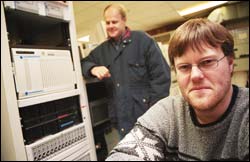The fall and rise of e-mail
12 July 2004
Proud parents: ICTS' Michael Wood (right) and André le Roux, were among the many staff members in the department who gave up plenty of sleep to restore UCT's e-mail server, with the new storage array.
The recent and temporary disappearance of e-mail facilities - plus the brief loss of Calendar - had many staff members drifting aimlessly around their office corridors, suffering from some technological version of separation anxiety. It got people talking again, if only about not having e-mail.
But things could have been that much worse had it not been for the zeal of a number of technicians and backroom staff at Information & Communication Technology Services (ICTS) who, firstly, happened to be at their desks on a Saturday morning to pick up on the problem and nip it in the bud.
André le Roux, leader of the Computing Platforms team at ICTS, was trying to make some inroads into his e-mail on the morning of June 19 when he found he couldn't access e-mail. He ran into senior systems engineer Kgabo Sepuru, and the two decided to investigate. They found that the e-mail systems storage array had suffered a hardware failure. On noticing the array was registering errors, they called in Dr Fred Goldstein who, in turn, summoned Hewlett-Packard, who supplied and maintain the array.
Technicians from the company worked on and tweaked the system into the wee hours of Sunday morning, but the problem persisted. It was at about much the same time that Le Roux witnessed the Calendar server go offline as well.
After that, ICTS took things into their own hands. Le Roux and colleagues immediately started to build a new e-mail server from scratch, with the very obliging Light Edge Technologies rushing the required disks and bits to UCT. The next day, ICTS also flew back its UNIX operating systems wiz, Michael Wood, who was just settling into a training course in Johannesburg.
According to Le Roux, building the new server - and resuscitating Calendar - was the easy bit. It was restoring the mail store, backed up on another data server elsewhere, that would take time, as it also involved verifying the information and reconstructing all mail folders. At one stage, there were some 300 000 mail messages awaiting delivery.
In a recent report Prags Naicker, ICTS executive director, noted that ICTS suspects possible voltage fluctuations in the electricity supply to the computer room may be behind the collapse of two systems on a single day. The department is already looking into the problem and is using state-of-the-art equipment to monitor the room's power supply.
According to Le Roux, there's still some work to be done, and although the system has stabilised - you can now e-mail your next-door colleague - ICTS is keeping a close eye on it. "Unfortunately, you can't easily simulate for something like this," he says. "You try to plan for everything, but you never know what's going to happen."
But ICTS is also taking the long view.
UCT's Council recently approved an Information and Communication Technology (ICT) Strategy, and a handsome financial injection into ICT infrastructure (more on that in upcoming Monday Papers). This strategy will, for example, include the use of a second computer room in Bremner, one that will serve as a safety net for the room in the Computer Science Building. "Switching over to a geographically separate location ensures that the e-mail service is on a different leg of the network and the power supply comes from a different part of the grid," noted Naicker in his report.
As frayed as nerves may have been among staff, ICTS technicians - too many to mention here - deserve a huge pat on the back for their efforts over the difficulties, said Pippa Moll, head of Technical Support Services at the department. Not only did they give ICTS a head start on the problem, but also worked through many a night to make sure that staff got their messages in the shortest possible time.
Theirs is often a thankless task, with everybody insisting that their problems be seen to by yesterday. But ICTS staff felt just a little better about the long hours when DVC Professor Martin Hall, who had a huge hand in green-lighting the ICT strategy and the wherewithal for it, popped in recently to show his support for their efforts.
And few would have been more grateful than Hall, renowned for his prodigious e-mailing.
 This work is licensed under a Creative Commons Attribution-NoDerivatives 4.0 International License.
This work is licensed under a Creative Commons Attribution-NoDerivatives 4.0 International License.
Please view the republishing articles page for more information.










